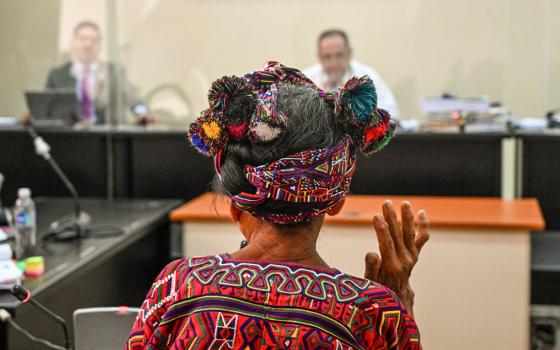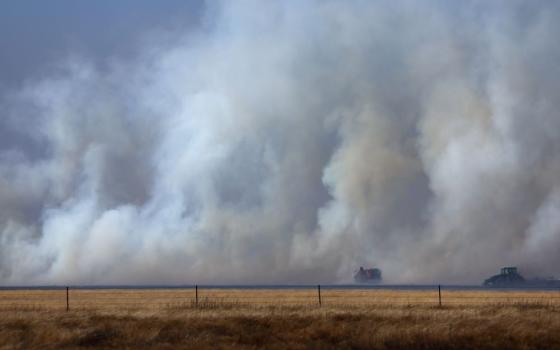Every year for Dr. Martin Luther King, Jr.’s birthday, I reread his writings to glean insight, courage and strength for the year ahead.
This past week, while visiting Nags Head, North Carolina, I’ve been studying his famous 1963 “Letter from the Birmingham Jail.” It was written after his Good Friday arrest for marching to break unjust segregation laws without a permit.
One of the great documents in our history, this letter was composed in his darkest hour, just as the nonviolent movement for civil rights was on the verge of total collapse. And yet, the letter is filled with faith, hope, and love -- enough to enlighten us in our own dark times.
While in his bleak jail cell, King came across an open letter written to him that January by eight white church leaders in Birmingham, criticizing his work for racial justice as “unwise and untimely.” He spent that week crafting a lengthy response on newspaper scraps, even toilet paper.
King’s eloquent cry for justice was reasonable, passionate and unparalleled. A careful reading shows concern for at least three themes: nonviolence, civil disobedience, and the church.
Nonviolent Gadflies
“Injustice anywhere is a threat to justice everywhere,” Dr. King writes. “We are caught in an inescapable network of mutuality, tied in a single garment of destiny. Whatever affects one directly, affects all indirectly.”
That’s why he’s in Birmingham, he explains. The white church leaders call him an outside agitator; he wonders why they have done so little to relieve the suffering in their midst.
They charge him with creating tension, albeit for justice and equality; that’s the duty of every Christian, he responds.
I have earnestly worked and preached against violent tension, but there is a type of constructive nonviolent tension that is necessary for growth. The purpose of the direct action is to create a situation so crisis-packed that it will inevitably open the door to negotiation.
We have not made a single gain in civil rights without determined legal and nonviolent pressure. History is the long and tragic story of the fact that privileged groups seldom give up their privileges voluntarily…
[But] we who engage in nonviolent direct action are not the creators of tension. We merely bring to the surface the hidden tension that is already alive. We bring it out in the open where it can be seen and dealt with. Like a boil that can never be cured as long as it is covered up but must be opened with all its pus-flowing ugliness to the natural medicines of air and light, injustice must likewise be exposed, with all of the tension its exposing creates, to the light of human conscience and the air of national opinion before it can be cured.
King used creative nonviolence to lance the boil of racism, segregation and injustice. His public project was messy, but it began the healing process. He knew the infection of violence ran deep among us, and the work of healing would continue for generations.
“We… need … nonviolent gadflies to create the kind of tension in society that will help men and women to rise from the dark depths of prejudice and racism to the majestic heights of understanding and brother/sisterhood,” he writes.
Nonviolent gadflies. That’s us. Like King, we too are “nonviolent gadflies” who create tension to help force new understanding, disarmament, justice and peace. As “nonviolent gadflies,” we agitate for the abolition of war, poverty, nuclear weapons and environmental destruction. And through our creative nonviolence, lance the boil of violence for the sake of societal healing.
Breaking Unjust Laws
Next, King tries to explain the methodology of civil disobedience. Some people must challenge unjust laws to push for positive social change, he writes.
As King outlines the theory, he teaches that civil disobedience has a noble place throughout history and the biblical tradition.
One who breaks an unjust law must do it openly, lovingly, and with a willingness to accept the penalty. An individual who breaks a law that conscience tells him is unjust, and willingly accepts the penalty by staying in jail to arouse the conscience of the community over its injustice, is in reality expressing the very highest respect for law.
[We have seen this] in the refusal of Shadrach, Meschach and Abednego to obey the laws of Nebuchadnezzar because a higher moral law was involved. It was practiced superbly by the early Christians who were willing to face hungry lions and the excruciating pain of chopping blocks, before submitting to unjust laws of the Roman Empire. To a degree academic freedom is a reality today because Socrates practiced such civil disobedience.
“We can never forget that everything Hitler did in Germany was ‘legal’ and everything the Hungarian freedom fighters did in Hungary was ‘illegal,’” King reminds us. “It was ‘illegal’ to aid and comfort a Jew in Hitler’s Germany.”
King does not want us to sit by while injustice and war run rampant. Take nonviolent action, even to the point of breaking unjust laws, he commends, in order to safeguard justice and peace -- as Jesus and the early church did.
Without this hard work time itself becomes an ally of the forces of social stagnation. We must use time creatively, and forever realize that the time is always ripe to do right. Now is the time to make real the promise of democracy, and transform our pending national elegy into a creative psalm of brother/sisterhood.
All of us are called to be “co-workers with God” for justice and peace, King insists. Some may even have to engage in civil disobedience. Work “tirelessly” and “persistently,” he urges. This is what the times require.
Disappointment with the church
Exhortations on nonviolence and civil disobedience might be expected from King. But the remainder of the letter takes on a surprising topic: King’s deep disappointment with the church. Such talk is rare.
We know little of the disappointment of St. Francis, Franz Jagerstatter, Dorothy Day or Oscar Romero -- though they must have been profoundly hurt by the church leaders of their day. We can barely imagine Jesus’ anguished disappointment with the religious leaders of his day.
Like us, King had hoped that church leaders would lead the struggle for racial equality, justice and peace. He presumed that anyone who claimed to follow the nonviolent Jesus would seek the fullness of God’s reign, promote its consistent ethic of nonviolence, and advocate for the disenfranchized.
Alas, King learned the hard the way, as we are learning, that church leaders rarely join -- much less lead -- the struggle. Too often they stand in the way.
I have wept over the laxity of the church. But my tears have been tears of love. There can be no deep disappointment where there is not deep love…Yes, I see the church as the body of Christ, but oh! how we have blemished and scarred that body through social neglect and fear of being nonconformists.
The contemporary church is often a weak, ineffectual voice with an uncertain sound. It is so often the arch-supporter of the status quo. Far from being disturbed by the presence of the church, the power structure of the average community is consoled by the church’s silent and often vocal sanction of things as they are. But the judgment of God is upon the church as never before. If the church does not recapture the sacrificial spirit of the early church, it will lose its authentic ring, forfeit the loyalty of millions, and be dismissed as an irrelevant social club with no meaning for the twentieth century. I am meeting young people every day whose disappointment with the church has risen to outright disgust.
An irrelevant social club. Today millions dismiss our church leaders as far worse. Outright disgust is commonplace. Yet despite his disappointment, King remains in the struggle precisely as a church person.
But in a rare moment of candor, he speaks of turning within to find strength.
“Maybe I must turn my faith to the inner spiritual church, the church within the church, as the true ecclesia and the hope of the world,” King concludes. “I hope the church as a whole will meet the challenge of this decision hour. But even if the church does not come to the aid of justice, I have no despair about the future.”
No despair about the future. King has hope -- hope in nonviolence, hope in the civilly disobedient, hope even in the church as the community of followers of the nonviolent Jesus.
It’s that hope which makes him an exemplary “nonviolent gadfly,” an authentic church leader, a bright headlight leading us home through the darkness.
An Extremist for Love
“You’re just an extremist,” the eight white churchmen write.
At first, King was hurt by this dismissal. But on reflection, he decides it’s a compliment. In times of violence, injustice and war, what else is there to do, he asks, but be an extremist for love, an extremist for peace, an extremist for nonviolence?
The question is not whether we will be extremist but what kind of extremist we will be. Will we be extremists for hate or will we be extremists for love? Will we be extremists for the preservation of injustice, or will we be extremists for the cause of justice?
We need more extremists for love, peace and nonviolence, King concludes.
Be nonviolent gadflies who work for disarmament, justice and peace, he advises. Don’t let your disappointment with the church paralyze you. Set your sights high, take new risks for love and truth, and be the church you wish others would be.
King’s great letter continues to instruct today. It challenges us to break free of complicity, despair and disappointment; to use nonviolence creatively for justice and peace; and to follow Jesus as an extremist for love, peace and nonviolence.
As we begin a new year with violence everywhere, from Tucson to Kabul, I hope and pray we heed King’s word and example.
*****
To hear a new podcast interview with John Dear, go to www.jesusradicals.com. John will give a keynote speech at the annual Sabeel Conference next month in Bethlehem, Palestine/Israel (see: www.sabeel.org). His latest book, Daniel Berrigan: Essential Writings (Orbis), and other recent books, A Persistent Peace and Put Down Your Sword, as well as Patricia Normile’s John Dear On Peace, are available from www.amazon.com. To contribute to Catholic Relief Services’ “Fr. John Dear Haiti Fund,” go to:http://donate.crs.org/goto/fatherjohn. For further information, or to schedule a lecture or retreat, visit: www.johndear.org.
Editor's Note: We can send you an e-mail alert every time an On the Road to Peace column is posted to NCRonline.org. Go to this page and follow directions: E-mail alert sign-up. If you already receive e-mail alerts from us, click on the "update my profile" button to add On the Road to Peace to your list. |




